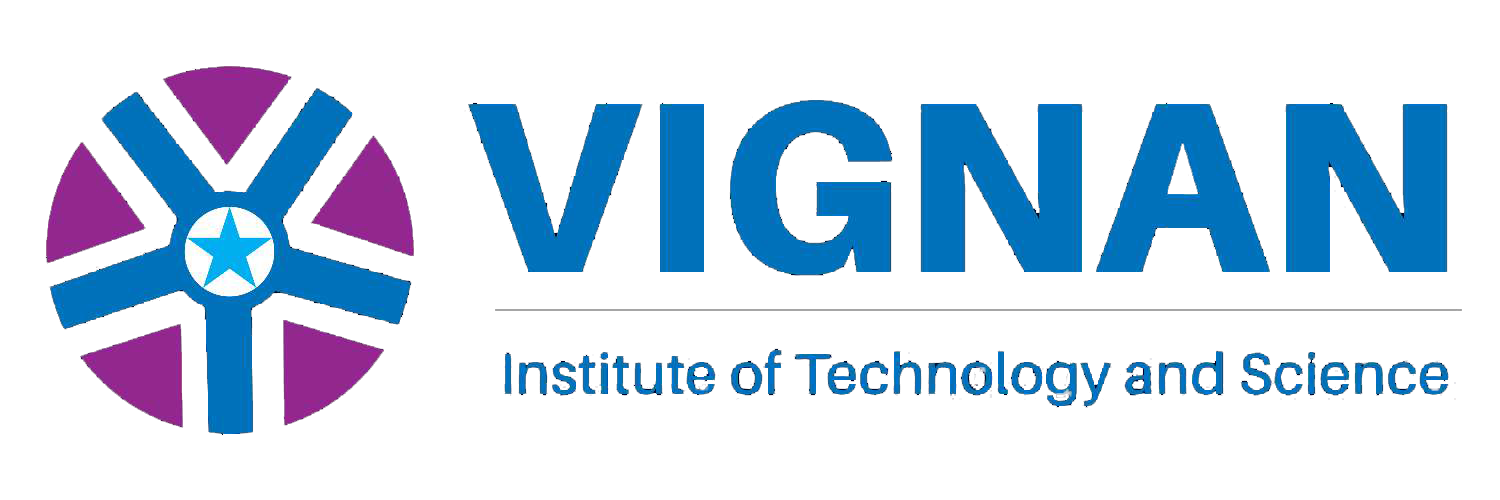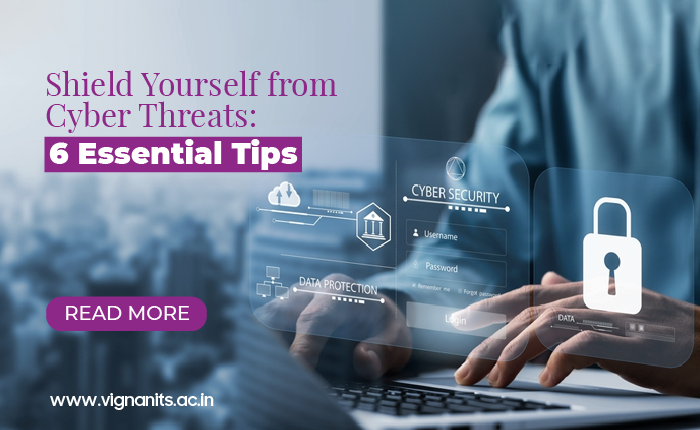In today’s digital world, cyber-attacks have become common thing. Cybersecurity is of utmost importance as it protects our personal and professional information from falling into the wrong hands.
The CSE colleges in Hyderabad and engineering colleges in Hyderabad like Vignan Institute of Technology and Science educate their students on the importance of cybersecurity. Therefore, individuals need to take proactive steps to protect themselves from cyber-attacks. By being aware of the potential risks and vulnerabilities, individuals can take steps to secure their devices and personal information.
In this blog post, VITS has listed 6 tips that you can use to protect yourself from cyber attacks, including the use of strong passwords, multi-factor authentication, antivirus software, and more.
By following these tips, you can reduce the risk of falling victim to cyber-attacks and enjoy a safer online experience.
- Use Strong Passwords:
One of the most crucial tips to prevent cyber attacks is to use strong passwords. It is essential to create complex passwords that include upper and lower-case letters, numbers, and special characters.
Avoid using easy-to-guess passwords such as your birthdate or your name. Change your passwords regularly. Make a strong password by adding a variation to your password, and be unpredictable.
It should be at least 12 characters long since it is challenging to crack long passwords. Use different passwords for different accounts, and consider using a password manager to store them securely.
Finally, use multi-factor authentication whenever possible to add an extra layer of security to your accounts. Also, don’t share your password with anyone to avoid a data breach.
- Use Two-Factor Authentication:
This method provides an extra surface of security to your accounts. This process requires you to provide two forms of identification to log in to your accounts.
This added layer of protection helps to prevent unauthorized access to sensitive information and protects users from phishing and other cyber attacks. This will improve your security and protect you from phishing attacks.
There are several types of Two Factor Authentication methods:
- SMS Authentication: Users are sent a one-time code to their registered mobile number through a text message. It could be a 6-digit or 4-digit code for a limited time. After that, the code expires and will not work.
- Authentication Apps: Authentication apps, such as Google Authenticator or Authy, generate a unique code on the user’s mobile device that changes every 30 seconds. This code is entered along with the user’s username and password to access their account.
- VPN To Access Public Wi-Fi:
Accessing public Wi-Fi can pose a significant threat if you’re unaware your network is appropriately encrypted.
Using public Wi-Fi can run the risk of exposing your banking or financial data. Hackers can easily steal your data by breaching the network. This is where a Virtual Private Network (VPN) can come in handy.
VPN is a service that encrypts your network from masking your IP address. By masking your IP address, a VPN can help to keep your personal information secure and private.
Therefore, it is highly recommended to use a VPN whenever you need to access public Wi-Fi networks to ensure that your online activity remains safe and secure.
- Be Cautious of Emails:
Emails are a common way for cybercriminals to gain access to your personal information. Be cautious of suspicious emails and avoid clicking on any links or attachments unless you are certain of their authenticity.
You can also turn off the automatic download of attachments in your settings to avoid a cyber attack. If you receive an email that seems suspicious, delete it immediately.
These emails are particularly made to phish you by offering free money or a free voucher so you can click on them. When you click on the link, you’re allowing the hacker to attack your data easily.
If your email is linked to your bank or other important data, use a strong combination of passwords to avoid a cyber attack.
Also, look closely to see if the website is safe when you’re browsing. For example, HTTPS at the start of the website indicates that the website is authentic and safe.
- Use a Trusted Internet Antivirus:
Antivirus software is a critical tool in protecting your computer from cyber-attacks.
Internet antivirus software provides protection against viruses, malware, spyware, and other online threats that can compromise your computer’s security and steal your personal information.
Remember to practice safe browsing habits and avoid risky websites to protect your personal information further. There are several antivirus options available to protect you from cyber-attacks. Here is a few excellent and trusted antivirus list:
- Norton
- Net Protector 360
- McAfee
- Quickheal
- K7
- Kaspersky
- Bitdefender
- Avast
- Educate Yourself:
Stay informed about the latest cyber threats and learn how to protect yourself. Attend seminars and workshops, read news on the internet, read blogs on new phishing or malware, and take online courses to stay up to date on the latest trends and threats.
You can also talk to your friends to stay updated on the latest malpractices that are going on online. Also, please don’t put out too much on your social media while posting images or videos, as it can hint at the criminality of your data.
So, it is important to stay vigilant and be aware of potential threats to your personal and professional information. You can also install a firewall to defend yourself from cyber attacks.
Conclusion
In conclusion, cybersecurity is essential in today’s digital world. Follow these tips to protect yourself from all potential cyber-attacks. Remember to use strong passwords, be cautious of emails, use two-factor authentication, back up your data, and educate yourself about potential threats. Vignan Institute of Technology and Science, a CSE college in Hyderabad along with other engineering colleges in Hyderabad inform their students of these essential tips to secure their information. Stay safe and stay informed!

